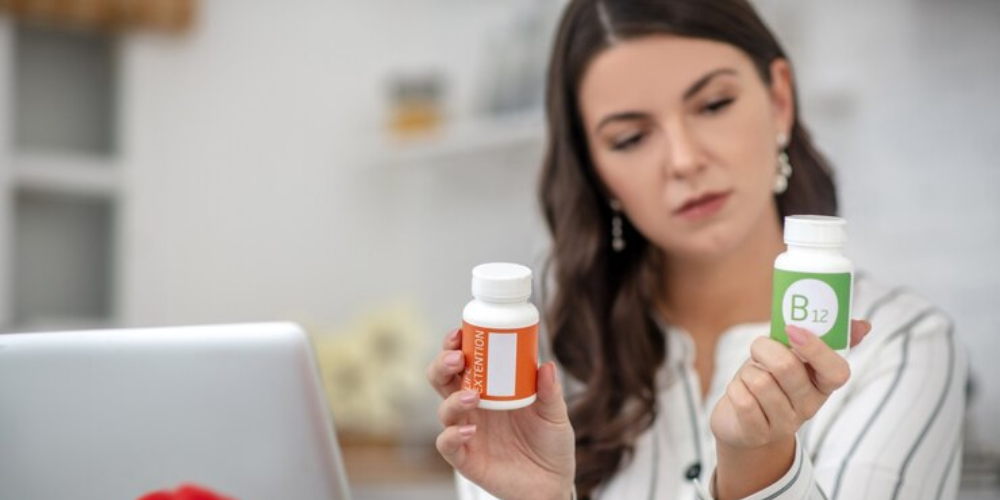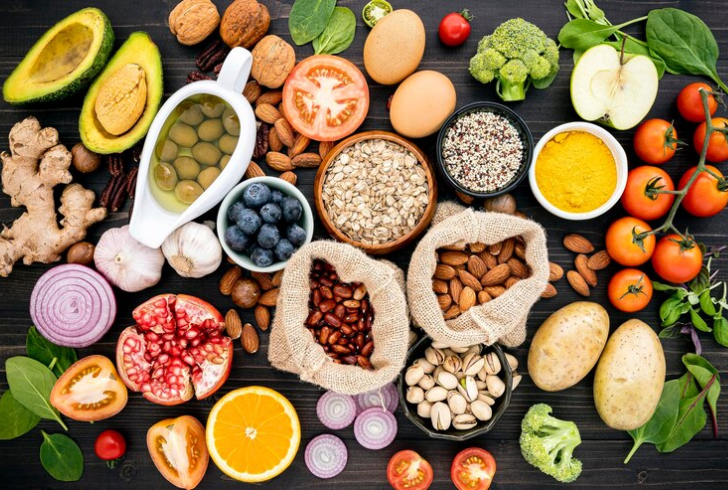
Essential Vitamins for Gut Health – A Comprehensive Guide

Why is Gut Health Important?

Freepik | asier_relampagoestudio | Consider your gut the silent hero of your health; it does more than just digest food.
Think of your gut as the quiet hero of your health. It goes beyond breaking down food. Research suggests the gut microbiome may influence:
- Immune function – A healthy gut microbiome can act as a first line of defense against harmful invaders.
- Sleep – The gut-brain axis connects your digestive system to your mood and sleep patterns.
- Nutrition and metabolism – The gut plays a role in extracting nutrients from food and regulating metabolism.
- Autoimmune diseases – Some research suggests a link between gut health and autoimmune conditions.
- Other disorders – Studies are exploring potential connections between the gut and conditions like type 2 diabetes and heart disease.
In short, a healthy gut is the foundation for a healthy you.
Signs of an Unhealthy Gut
Recognizing the signs of an unhealthy gut is crucial for addressing potential imbalances and restoring optimal digestive function. Here are some common indicators that your gut may be out of balance:
- Digestive Issues – Persistent bloating, gas, diarrhea, or constipation can signal disruptions in gut flora or impaired digestion.
- Food Intolerances – Developing sensitivities to certain foods, often accompanied by discomfort or inflammation, may indicate an underlying gut issue.
- Fatigue and Low Energy – Chronic fatigue or a lack of energy despite adequate rest could stem from nutrient malabsorption or an imbalance in gut bacteria.
- Mood Swings – Fluctuations in mood, including anxiety, depression, or irritability, may be linked to disruptions in the gut-brain axis.
- Skin Problems – Conditions like acne, eczema, or rosacea may be exacerbated by gut imbalances, highlighting the skin’s connection to gut health.
Monitoring these signs can provide valuable insights into the state of your gut health and guide you toward adopting strategies to promote balance and vitality.
How to Improve Gut Health

Freepik | EyeEm | Load up on fiber-rich fruits, vegetables, whole grains, legumes, and nuts to nourish your gut’s good bacteria.
Vital Vitamins for Gut Health

Freepik | Check with your doctor before beginning any new supplements.
Vitamins play a crucial role in maintaining optimal gut health, supporting digestion, nutrient absorption, and overall well-being. Here are some key vitamins for gut health:
- Probiotics – These live microorganisms can help restore balance in your gut microbiome. Look for fermented foods like yogurt, kimchi, or kombucha, or consider probiotic supplements.
- Prebiotics – These dietary fibers act as food for your gut bacteria, promoting their growth. Load up on fruits and vegetables, or explore prebiotic supplements.
- Apple Cider Vinegar – This fermented apple juice contains pectin, a prebiotic fiber, and may also contain probiotic bacteria. But, more research is needed to confirm its gut health benefits.
- Psyllium Husk – This fiber supplement can help regulate bowel movements by adding bulk to stool or softening it. It’s a good option if you struggle to meet your daily fiber intake through food sources.
- Vitamin D – Deficiency in this sunshine vitamin is common. Studies suggest vitamin D may play a role in gut health by regulating the intestinal wall. Consult your doctor to see if a vitamin D supplement is right for you.
- Vitamin C – This water-soluble vitamin may help the body produce short-chain fatty acids that benefit the gut-brain connection and protect the intestinal barrier. Citrus fruits, broccoli, and supplements are good sources of vitamin C.
- Butyrate – This short-chain fatty acid feeds the cells lining your colon and is produced by gut bacteria breaking down fiber. While it’s available in supplement form, research on its effectiveness is ongoing.
- Glutamine – This amino acid may support the gut microbiome, reduce inflammation, and strengthen the gut lining. Early research suggests it may help with irritable bowel syndrome (IBS) symptoms, but larger studies are needed.
- Ginger: This root has anti-inflammatory and antioxidant properties. A study suggests short-term ginger juice consumption may improve gut bacteria diversity, but further research is needed.
- Curcumin – Found in turmeric, curcumin boasts anti-inflammatory and antioxidant effects. Some research suggests it may promote healthy gut bacteria, but more studies are needed to confirm these benefits in humans.
Your gut is a complex ecosystem that impacts your health. You can cultivate a thriving gut microbiome by prioritizing a healthy diet, exercise, and stress management. Consider exploring vitamins for gut health in consultation with your doctor. Remember, these supplements aren’t magic bullets; a balanced lifestyle is key. By nurturing your gut, you’re investing in your well-being, paving the way for a healthier, happier you!
More in Health Insurance
-
`
Amanda Bynes Pregnant at 13? Debunking the Rumors
In recent years, the internet has been ablaze with rumors surrounding former child star Amanda Bynes, particularly regarding allegations of a...
July 1, 2024 -
`
Can Baking Soda Clean Your Lungs?
Years of inhaling cigarette smoke, pollution, and other toxins can leave you longing for a way to cleanse your lungs. The...
June 27, 2024 -
`
How to Build Muscle Mass After 60? 5 Proven Strategies
Curious about how to build muscle mass after 60? You are not alone. And the good news is that it is...
June 20, 2024 -
`
Prediabetic Foods That Can Lower Your Blood Sugar in 2024
Prediabetes is a health condition characterized by blood sugar levels that are higher than normal but not high enough to be...
June 13, 2024 -
`
Kelly Clarkson’s Weight Loss Journey | Here Are the Details
Kelly Clarkson’s weight loss has been a hot topic among fans and media alike. The iconic American singer and host of...
June 3, 2024 -
`
Looking to Build A Stronger Sculpted Back? Try Cable Back Workouts
Back workouts using cables, or cable back workouts as they are commonly known, have become the gold standard for anyone aiming...
May 22, 2024 -
`
How Much Water Should I Drink on Creatine? Hydration Tips
Creatine, a popular supplement among athletes and fitness enthusiasts, has gained widespread recognition for its ability to enhance muscle strength, power,...
May 17, 2024 -
`
What Is Bruce Willis’s Net Worth? Get the Inside Scoop Here!
Bruce Willis, the action hero who has saved the day countless times on screen, has built a legendary career. But how...
May 11, 2024 -
`
How to Sleep with Fluid in Lungs – Expert Tips
Living with fluid in your lungs can turn nighttime into a challenging experience, but with the right strategies, you can reclaim...
April 30, 2024















You must be logged in to post a comment Login